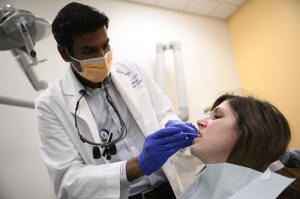Do you need fluoride treatment after a teeth cleaning? Dental experts
weigh in
[March 06, 2025]
By LAURA UNGAR
When Tristen Boyer recently had a couple of cavities filled, her dentist
suggested she get fluoride treatment afterward. She has Crohn’s disease,
which puts her at increased risk for tooth decay.
"It’s something I felt like I should get done,” the 22-year-old
University of Kentucky student said. “It’s something I’m going to keep
doing.”
Dentists and hygienists often propose fluoride treatments to patients in
the dental chair to prevent cavities and strengthen teeth. But the
relatively simple procedure – which involves applying a varnish, gel or
foam directly to the teeth – isn’t always covered by insurance,
especially for adults.
So when is it worth getting? Here are some ways to figure that out.
Who needs in-office fluoride treatment?
If there's a high risk of tooth decay, then professional fluoride
treatments can help.
But if “you haven’t seen any decay in years, you’re probably OK. What
you’re doing at home is probably enough,” said Dr. Robert Weyant at the
University of Pittsburgh.
Besides looking at cavity history, your dentist may also ask about risky
behaviors, such as drinking lots of soft drinks, and your oral health
regimen.
Patients “who don’t have access to fluoridated water, don’t use
fluoridated toothpaste or don’t floss regularly” may be good candidates
for fluoride treatments, said Dr. Alex Daniel of Johns Hopkins
University.

Treatments may also benefit certain groups more than others. Women in
menopause, for example, experience hormonal changes that can lead to
oral health problems. And people taking certain medications can get dry
mouth, which means fewer bacteria-killing enzymes and potentially more
decay.
For patients deemed to be at risk, dentists generally recommend
treatments every three, six or 12 months.
What are the pros and cons of fluoride treatment?
Dental fluoride prevents decay by helping tooth enamel – the hard outer
layer of the tooth – better resist acid caused by bacteria in the mouth.
[to top of second column]
|

Alexander Daniel, DDS, left, demonstrates fluoride treatment on
resident Cameron Onken, right, at the Johns Hopkins Outpatient
Center, Friday, Feb. 28, 2025, in Baltimore. (AP Photo/Nick Wass)
 “Acid dissolves away tooth enamel,
which weakens it – which is what makes cavities," said Ohio dentist
Dr. Matthew Messina, a spokesman for the American Dental
Association.
Fluoride, a mineral, strengthens the enamel, making
it harder.
The scientific evidence behind fluoride treatments is stronger for
children than adults. But whether the benefit is stronger for kids
is uncertain, Weyant said, because there hasn’t been as much
research in adults.
Dentists said there are no safety concerns about the treatment. The
only real side effect is an uncommon one called fluorosis, a
cosmetic discoloration of the teeth if someone gets a little too
much fluoride.
Dental experts acknowledged that recent opposition to fluoride in
drinking water by some — including Robert F. Kennedy Jr., the
nation's new health and human services secretary —may give some
people pause. But even if you use fluoride toothpaste, drink
fluoridated water and get occasional in-office fluoride treatments,
dentists said you’re getting a relatively small amount of the
mineral that poses no danger.
Is fluoride treatment worth it?
Fluoride treatments cost anywhere from around $25 to $55. Though
many insurers cover the cost for kids, adults generally pay out of
pocket.
Boyer, who used to get the treatments as a child, paid $30 for her
first adult treatment. Though she wishes it was covered by
insurance, she said that's a small price to pay to prevent decay,
expensive dental procedures and possible tooth loss.
“We only have one set of teeth,” she said. “The longer you can keep
them, the longer you should.”
All contents © copyright 2025 Associated Press. All rights reserved |